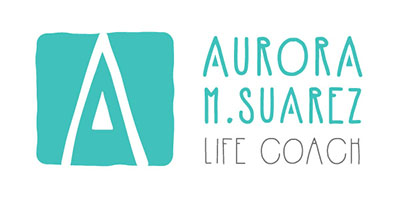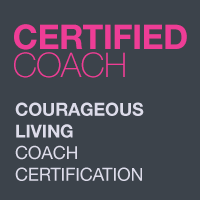
A few days ago, Instagram alerted me that I had started training to be a life coach six years ago. I was so surprised that it had been that long.
I still remember our four-day retreat in California that kicked off the Courageous Living Coaching Certification. I had never formally coached anyone in my life before that weekend. My classmates who confidently stood up to coach fellow classmates in front of the entire group intimidated me. When I was given feedback on my own coaching, it cut me to the core and my already-shaky confidence completely disappeared. The next time I had to do it, I broke down in tears and one of the mentors had to hug me and whisper, “come from a place of love, come from a place of love” over and over until I calmed down.
Although I had done so much work previously in trying not to be hard on myself, it was difficult to overcome my perfectionism, my self-defeating belief that everything I did had to be a success. That was one of the big gifts of training to be a life coach—to acknowledge my humanity and to not let failure define me or my worth.
When I left California, I then had to do 10 months of life coach training. That included weekly homework, LOTS of reading, hours of coaching with paying clients, twice-a-week classes (one of which was scheduled at 1 a.m. because of the time difference!), and marketing tasks such as setting up a website, coming up with a social media strategy and defining who I was as a coach.
Looking back from this time six years onwards, here’s what I learned about myself throughout the training process:
1.Change your mindset—it’s okay to be a beginner.
A tarot reader pulled cards for me that year. One of the cards that came out was The Fool. The Fool represents having the mindset of a beginner, of stepping optimistically (and yes, even foolishly) into your journey because you don’t know what lies ahead.
I had to embrace being a fool rather than being an expert. It is both humbling and freeing—humbling because I had to listen to feedback and do work on the actual thing to get better and freeing because I was able to accept that it was okay to be a beginner, okay to make mistakes, okay to not know.
2. Be patient and work through your resistance.
One of my favorite quotes is: “Have patience. All things are difficult before they become easy.” (Saadi)
The weeks after I came home from my retreat, I would wonder if I really fit into a group of mostly white Americans and if they could understand my Asian self and my Filipino challenges. I would struggle with staying awake for the 1 a.m. classes. The ideas I was reading about in books wouldn’t stick. I had to overcome my shyness to reach out to people and offer my coaching services. I would brainstorm ways so I didn’t have to continue with the program.
All those feelings were all valid. All those feelings were also about me resisting my present reality. My whole being was uncomfortable with all the changes in my life and my mind was trying to make excuses as to why I didn’t need to continue.
What kept me going? My downpayment for my coaching tuition (which cost as much as my entire four-year college education) was non-refundable. I knew I had to go through my training program if I wanted to make this my new career. When I would coach and my clients would have their lightbulb moments, those made up for all those doubts and difficulties.
3. Trust yourself.
I was very good at following instructions, at asking the “right questions,” at learning all the skills (mirroring, listening with empathy, getting to the core of the issue, making sure that all the attention was focused on the client). I was, as I had always prided myself on being, a good student.
But I realized what I needed to be was a good coach. And a good coach (and even business owner) had to be true to herself.
Instead of focusing on being a good student, I had to learn to discover who I was and trust myself, trust that I knew what to ask to reflect who I was and what mattered to me…even if they weren’t part of the list of prescribed questions.
I used analogies from my life. I listened to my intuition and raised issues even if the client never mentioned them (I usually turned out to be correct). I did fun exercises where we stood up, listened to our bodies and moved them. I gave them creative practices that weren’t in the handbook. I even shared my own experiences.
I was learning to trust myself. I was allowing my self and my truth to show up, to be seen and be heard. In so doing, I was making myself a more empathetic and more powerful listener and coach.
4. Trust God.
In the deepest part of me, I knew that I was being led down this path. Despite its unfamiliarity, this unpaved road was pulling me. Doors that I couldn’t push suddenly swung open. Solutions showed up as if there was never a problem to begin with. I made decisions that were contrary to popular opinion but seemed right in my body and my heart.
I remember what a coach once told me: What if God trusts you too—to walk down this path He chose for you, not with doubt and fear but with joy?
5. Listen to your inner critic.
The inner critic was a constant companion during those 10 months of training.
It would say: “You’re so bad.” “You don’t know what you’re doing.” “You have no skills.” “Are you even helping?” “Who are you that people will listen to you?” “See, no clients. I told you this was a mistake.”
So harsh, right? But these thoughts were nothing new.
Instead of pushing this cruel voice away, I learned another technique. In the past, ignoring or avoiding my inner critic was what I did. This wasn’t helpful as that voice was still taking up space in my head.
The trick was to actually listen to it and allow it to speak. After it had exhausted itself, I could then take these thoughts, assess them if they were true or not and if they weren’t, find a way to reframe them.
Here’s an example:
Inner critic: “You’re so bad.”
Me: “Yes, that’s actually true. Thanks for pointing it out. But that’s why I’m taking this training program so I can learn, work hard and get better. I’m bad now but I won’t be bad forever.”
By listening rather than pushing it away, I took away the power of the inner critic to take up space in my head and allow its fears to dominate me. It’s an incredible skill that I learned that helps my clients and me.
6. And that advice that the mentor coach repeated in my ear over and over: that’s still what I want to keep.
Her advice: Come from a place of love.
Coaching clients.
Making choices about what to do next for my business.
Deciding to not push through with live workshops and retreats in the middle of a pandemic.
Making time for rest, play, joy, pleasure and delight.
Coming up with new ideas and releasing them to the world.
Staying in this business instead of taking the easier path of finding full-time corporate work.
All of these decisions follow her advice. When I do, the light inside me shines, the fire inside me burns.
What would I tell Aurora from six years ago who was so filled with doubts, fears and insecurities:
The path ahead is completely unpaved and incredibly uncomfortable. You will make detours because of this discomfort but when you finally decide to make a commitment to your business, it will be incredibly rewarding and more wonderful and more fulfilling than you had imagined.
It will work out. You are a good coach. The ideas that are lying dormant inside of you are waiting to be recognized. Listen and trust yourself. Listen and trust God. You are on the right path, I promise.








Pingback: My life coaching journey, part 2